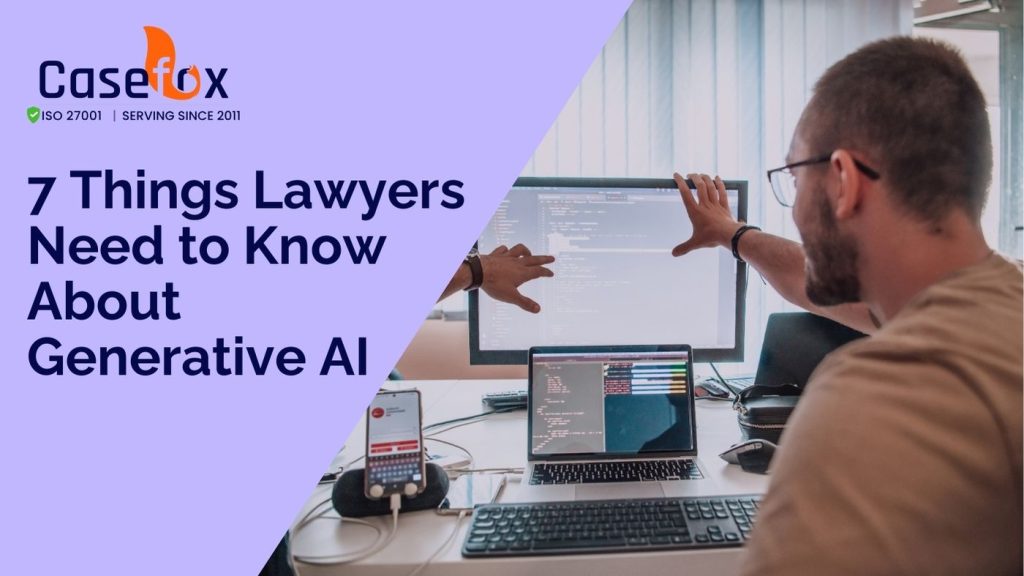Generative AI was the buzzword of 2023. Even in 2024, AI is evolving and creating waves in the industry. Generative artificial intelligence has affected almost every aspect of our world and the legal industry is no different. At this point, using the GenAI tool is not a trend but a necessity for legal professionals. It has the capability of automating routine tasks and making legal practice modern. But with ease and power comes the responsibility of management too. If you are a lawyer, using legal AI solutions, this blog is for you.
We are mentioning 7 things that you need to know about generative AI tools that can be game-changing for your legal practice.
What is Generative AI?
Generative AI is short for generative artificial intelligence. It is a type of AI that can help you create new content, such as text, music, AI images, and even videos. You can call it a super-powered copycat that can create new content on the basis of patterns and relationships between things in a huge dataset. This AI tool can use knowledge to generate entirely new stuff that follows those same patterns.
7 Things Lawyers Need to Know About Generative AI
Here are seven generative AI tips for lawyers that can help you improve your daily legal practice:
1. It is a tool for Help

AI is a primary tool that can help you with your legal practice. So your best bet is to understand it and master it. GenAI for lawyers can help you with drafting contacts, legal writing, legal research, and more. Additionally, AI tools can help you convert text to AI video effortlessly, allowing for more engaging presentations and explanations. Once you start using AI, you can get better at prompting, and by mastering AI prompts, you can get improved outputs.
2. Always Double-Check
Generative AI can be a helpful tool, but it is not perfect. So if you are using GenAI for your legal practice, always make sure you are double-checking the content that it is producing. Sometimes AI outputs can contain errors, biases, or even fabricated information. So don’t just present the information that you get from AI directly in front of the court without reviewing it.
3. Data Privacy is Paramount
Data privacy is a major concern when it comes to the legal industry. Lawyers have sensitive data of their clients that they are responsible for. So be mindful of the data that you are feeding into generative AI tools, especially when you are dealing with client information.
Make sure the platform that you are using has robust security measures. But also ensure that you are not putting information in AI that can put clients’ credibility at stake. Keep in mind that once the data you put in AI, it will be difficult to control.
4. Balance Between Copyright and IP
Legal AI tools can generate unique output according to the data and prompt you to provide it. But it also raises the question of intellectual property (IP) protections over those outputs. You can have questions like, Is it possible to create copyrightable work? If so, who will be the holder of the copyright?

But there is no clarity on these questions. This is why it becomes crucial to have a proactive IP strategy. Jurisdictions are divided about their views on copyright ownership for AI-generated works.
5. Shape Your Service Skills
Legal AI tools can help you in handling routine tasks and can automate administrative tasks. This will save lawyers time that they can use to focus more on client services and building relationships. Lawyers can sharpen their communication skills, work more on crucial cases, critical thinking, and negotiation. Because all these are the areas where AI can’t compete with lawyers. They have to work on their skills to provide improved service to their clients.
6. Local Regulations for AI Use
It is important to stay updated with rules and regulations regarding the use of AI in the state you are working. If you are in the European Union, compliance with the General Data Protection Regulation (GDPR) becomes critical. GDPR is necessary to maintain regulations concerning the use of AI. It helps in promoting transparency, data minimization, and user consent.
AI regulations can vary from region to region, so it is important to stay updated and informed about all the necessary rules.

7. AI Does not Replace Humans, it Just Assists
One of the most important things to know is that AI will not replace humans, it is there to just assist. AI is an aid that can improve legal practice. It can not take part in logical and critical thinking, it doesn’t understand emotions or make sound decisions. AI is a powerful tool if used correctly, it can provide help with strategies and complex legal issues.
The Bottom Line
If you are a lawyer or law firm planning to use generative AI, it is important to stay updated with all the necessary rules and regulations. You need to know how to use AI, what ways it can help you, and where you should avoid it. Make sure to check the data and content that is provided by it. By understanding the key points that we have mentioned above, you will be able to better leverage AI tools. There are various legal AI tools that you can use for your legal ops.

